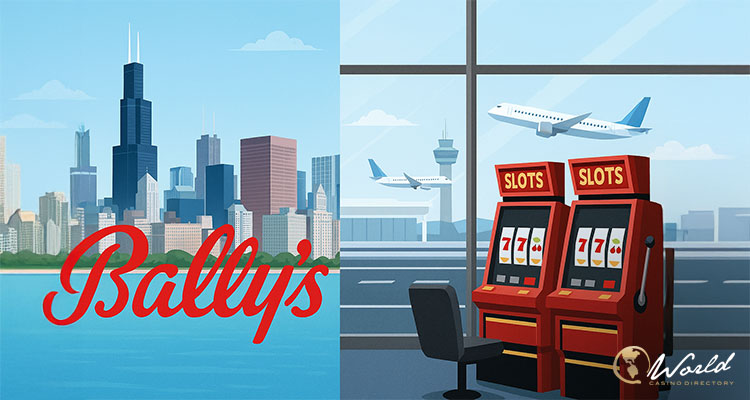Chicago officials are revisiting the long-discussed idea of installing slot machines at O’Hare and Midway International Airports, a plan that could soon take shape as part of Mayor Brandon Johnson’s efforts to close the city’s substantial budget gap.
During the opening day of City Council hearings on Johnson’s proposed $16.6 billion budget, Chief Financial Officer Jill Jaworski revealed that discussions with Bally’s Corporation — the city’s chosen casino partner — have progressed significantly.
“We’ve had a conversation with Bally’s about moving that forward. … We have been in conversation with them about investigating that. They have expressed interest,” Jaworski said, according to the Chicago Sun-Times. “There are some technical challenges that we have to deal with — ensuring that we’re complying with all the regulations that are at the airports. But those conversations have been ongoing. They have identified a site at Midway and we continue to work to move that forward.”
Renewed Push for New Revenue Streams
The announcement signals a potential policy shift for the Johnson administration, which has been searching for ways to address a $1.15 billion deficit. Previous efforts, such as a proposed 10.25% local tax on sports betting within city limits, have faced strong opposition from state lawmakers. The slot machine proposal, however, already has legal backing under the 2019 Rebuild Illinois Act — legislation that authorized slot machines at both O’Hare and Midway, provided they are located beyond TSA checkpoints and approved by the city.
That same 2019 law also paved the way for Bally’s $2 billion casino resort now under construction in River West. Expanding the company’s footprint into the airports could create synergy between Chicago’s gaming venues and one of the busiest travel markets in the nation. Combined, O’Hare and Midway serve over 105 million passengers each year, offering a massive captive audience for Bally’s and the city alike.
City Leaders See Big Fiscal Opportunity
Alderman Gilbert Villegas (36th) — who has long championed airport gaming — expressed satisfaction that the administration is finally acting on an idea he has pushed for years.
“They’re finally starting to realize that any form of revenue, especially given the deficit we’re facing, should be on the table. And this would generate anywhere between $30 million to $40 million,” Villegas said. “This was a layup. The General Assembly gave us this authority three or four years ago in the casino bill. And it’s a shame that the previous administration and this administration haven’t acted to look at all of the revenue that’s on the table instead of nickel-and-diming people.”
According to city projections, the airport slot machines could bring in up to $40 million annually — revenue that would largely come from travelers passing through Chicago rather than residents. The idea was also backed by mayoral candidate Garry McCarthy back in 2018.
Debate Over Airport Image and Experience
Not everyone in City Hall is convinced. Earlier this year, senior mayoral adviser Jason Lee voiced hesitation about replicating the model seen at Las Vegas’ Harry Reid International Airport, which houses about 1,300 slot machines across its terminals.
“I don’t know if a broader expansion or Vegas-style slots in a Chicago airport would really be something that the public is interested in,” Lee said in August. “That would be a pretty significant change to the culture of our airports. Chicago is not known primarily as a gaming destination like Las Vegas. It would … raise a number of concerns.”
Still, Villegas dismissed worries that slot machines could cheapen Chicago’s image. Instead, he envisions sleek, designated lounges — more akin to an airline club than a casino floor — located beyond the security checkpoints.
“Absolutely not,” he said when asked if the idea would make Chicago seem less sophisticated. “This would give passengers an opportunity to kill time while they’re waiting to fly out or they’re delayed or they’re being rerouted to Chicago, given all of the challenges with air traffic controllers.”
Villegas added that the lounges would offer food and drinks, creating what he described as “mini-casinos” where adults could play responsibly while waiting for flights. “If a lounge was available and I felt like it, maybe I’d go spend 10 or 20 bucks to kill more time, maybe get lucky and get some additional spending money for my trip,” he said.
What Comes Next for the Airport Slots
Though enthusiasm is growing among some city leaders, the process is expected to take at least a year as Bally’s and the city navigate regulatory hurdles. Compliance with both federal aviation and security standards will be essential, given the unique environment of airport terminals.
If approved, Chicago would become the third U.S. city to offer airport gambling, joining Las Vegas and Reno. Those Nevada airports have shown that slot machines can be a steady source of local revenue — Clark County, for instance, has collected over $1 billion from its airport slots over 36 years.
For Chicago, the proposal represents a balancing act between enhancing revenue and maintaining the city’s identity. Whether travelers will soon be greeted by the bright lights and chimes of slot machines at O’Hare and Midway remains to be seen, but the city’s latest discussions suggest the idea is closer to reality than ever before.


